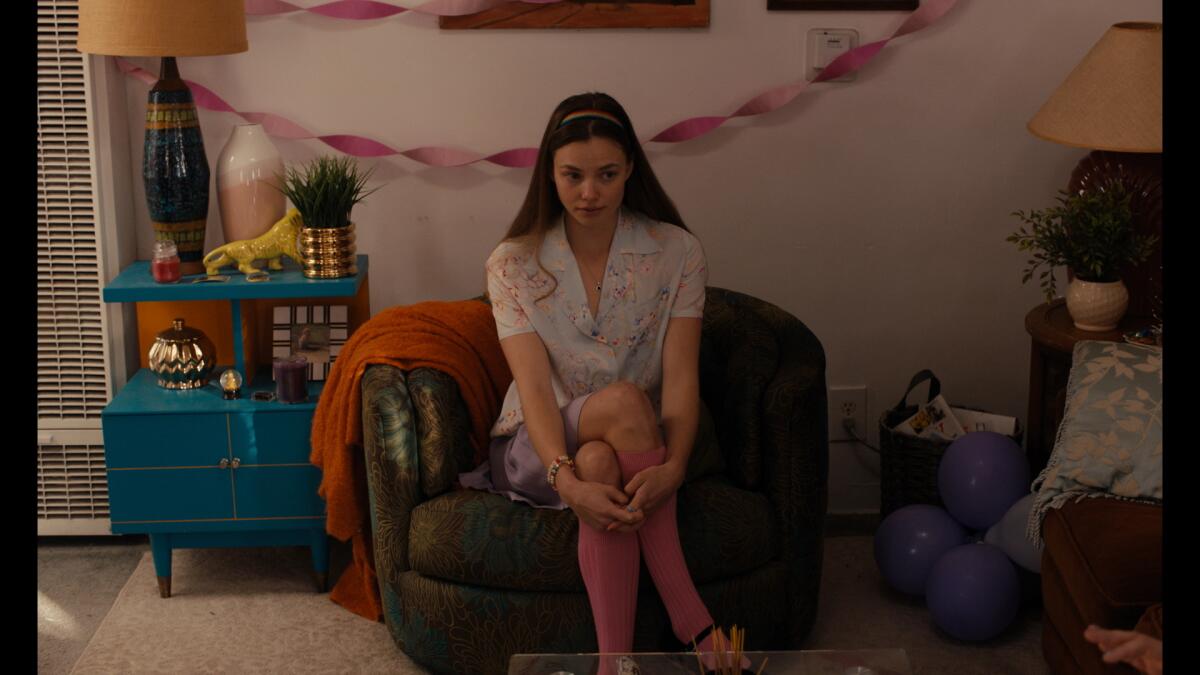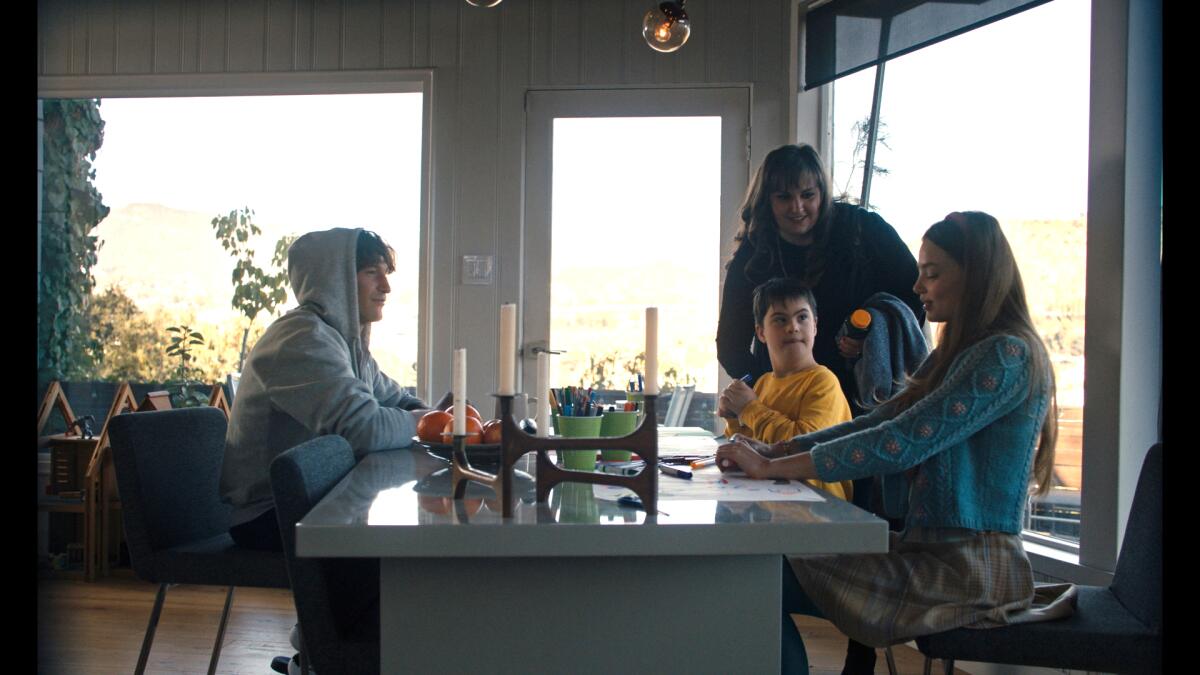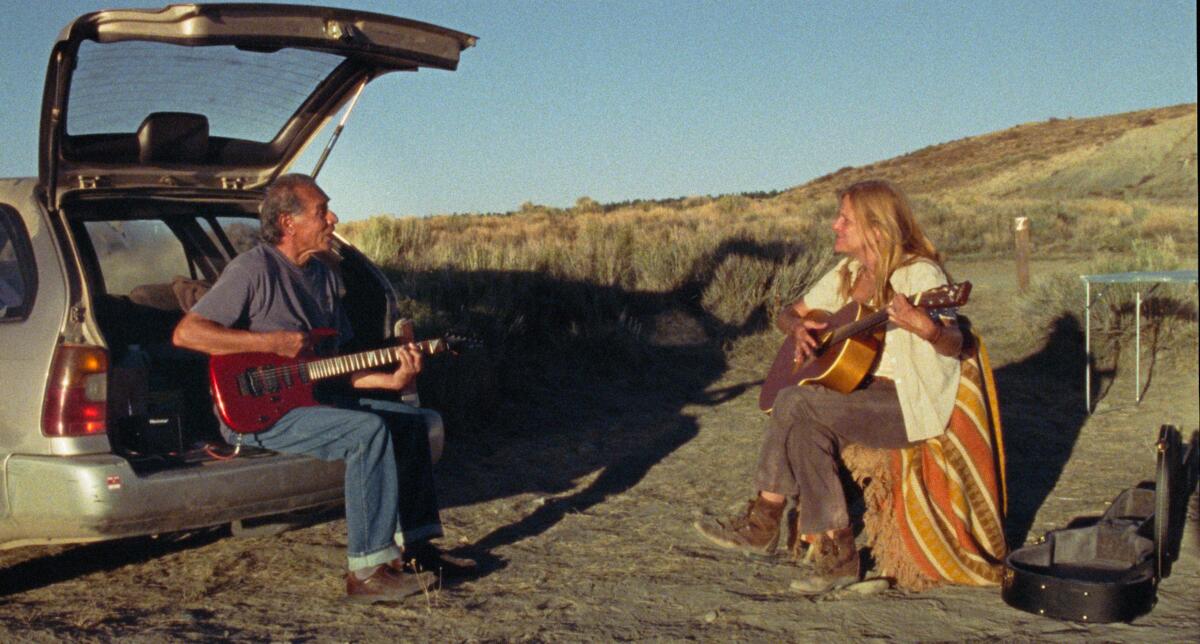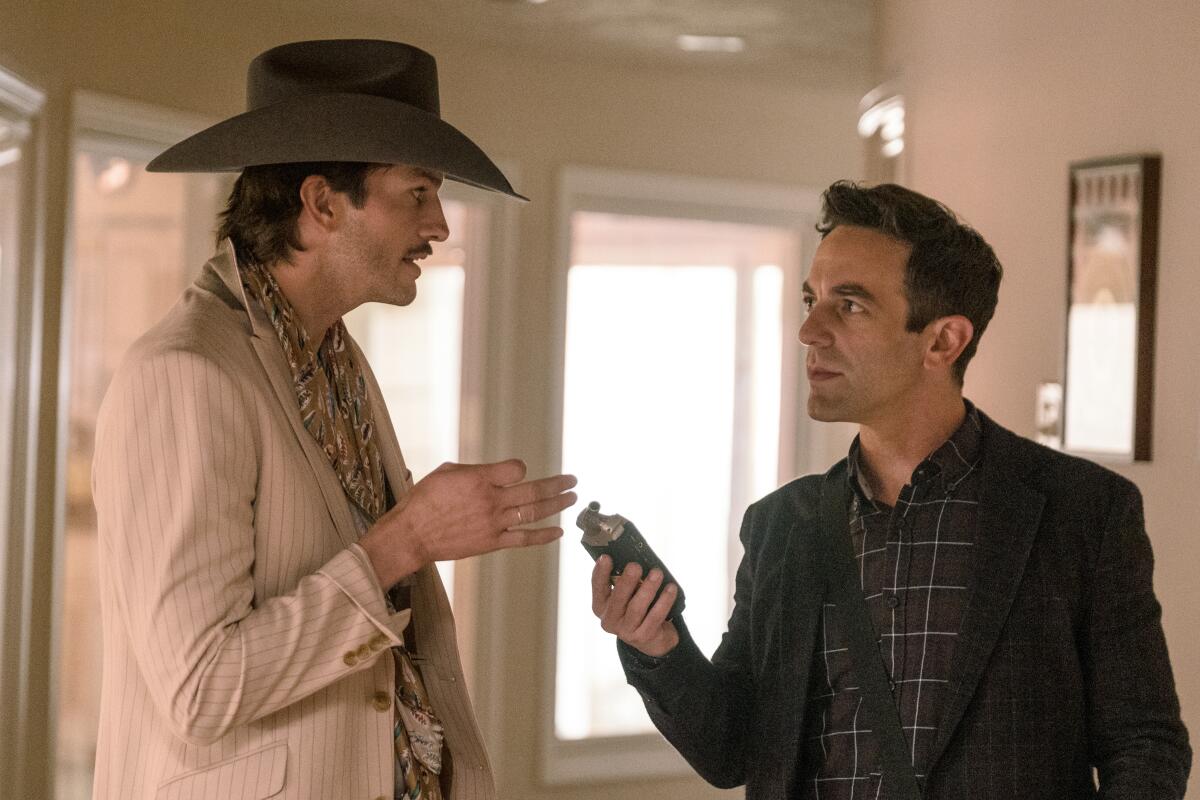Lena Dunham is not afraid of a ‘Sharp Stick’

- Share via
Hello! I’m Mark Olsen. Welcome to another edition of your regular field guide to a world of Only Good Movies.
Only good movies
Get the Indie Focus newsletter, Mark Olsen's weekly guide to the world of cinema.
You may occasionally receive promotional content from the Los Angeles Times.
“The Brown Bunny” surfaces. This Friday, Saturday and Sunday, the New Beverly will have what are now very rare screenings of writer-director-star Vincent Gallo’s 2003 film, “The Brown Bunny.” At the time, the film was somewhat overshadowed by its assorted controversies, including its explicit sex scene, as well as the evolving responses of critics to Gallo’s contentious and contrarian media persona. Now the film is ripe for reevaluation as a painfully earnest and vulnerable exploration of grief and regret. The screenings are sold out, but fans might find it worth grabbing a place in the standby line to see a film that is not likely to show publicly again anytime soon.
Ron Shelton and “Bull Durham.” The veteran filmmaker recently published “The Church of Baseball: The Making of Bull Durham,” a behind-the-scenes look at his beloved 1988 movie about a Minor League Baseball team. The film starred Kevin Costner, Susan Sarandon and Tim Robbins. It was initially passed on by every studio in Hollywood (twice, according to Shelton) before eventually becoming a box office hit, earning an Oscar nomination for Shelton’s screenplay and being considered among the best sports movies of all time.
Ryan Faughnder spoke to Shelton, who said, “I’m open with my criticism of the business. At the same time, I love and embrace the business. I’m part of this world. I think there are things to learn about the creative process, about the willfulness and serendipity involved. That’s why I have a little tiny bit of memoir in the book, because everything that I share ends up in the screenplay and onscreen. It’s a connection between life and art. Maybe that’s what the point of the book is.”
Early Baz. For anyone who wants to revisit more of Baz Luhrmann’s razzle-dazzle style after his recent “Elvis,” on Saturday the Academy Museum will screen archival 35 mm prints of the Australian filmmaker’s 1992 debut, “Strictly Ballroom,” and his frenetic 1996 adaptation of “Romeo + Juliet,” starring Leonardo DiCaprio and Claire Danes.
Enjoying this newsletter? Consider subscribing to the Los Angeles Times
Your support helps us deliver the news that matters most. Become a subscriber.
‘Sharp Stick’
Written and directed by Lena Dunham, “Sharp Stick” is her first feature film since her 2010 breakthrough debut, “Tiny Furniture,” and the cultural phenomenon that was her series “Girls.” The new film explores the sexual awakening of 26-year-old Sarah Jo (Kristine Froseth), who lives with her mother (Jennifer Jason Leigh) and sister (Taylour Paige) while working as a caregiver to the son of a troubled couple (Dunham, Jon Bernthal). The film is in limited release.
When the film premiered earlier this year at Sundance, The Times’ Amy Kaufman led a conversation with Dunham, Froseth, Bernthal, Paige and Leigh. Of working on a set with all-female department heads, Leigh said, “There’s just an effortless way of communicating that’s sometimes even nonverbal. You don’t even realize the difference, but you feel it. It just infuses the set. There’s an ease and an openness, I think, that’s different. It’s a very safe feeling.”
For the New York Times, Amy Nicholson called the film “an uneven, uneasy fable of desire,” before adding, “One of Dunham’s talents is her ability to capture the allure of heartbreakers, scuzzballs and dopes. … Watching Sarah Jo’s repeated hallucinations of a cartoon woman mating and giving birth, one can imagine Dunham whispering to the audience that moments of awkward, sloppy intimacy aren’t shameful — they’re the foundation of human existence.”
For Slate, Dana Stevens wrote, “In its basic story structure — a long-repressed woman goes on an at-first hesitant, then liberating voyage of self-discovery — ‘Sharp Stick’ is not unlike another recent release, ‘Good Luck to You, Leo Grande.’ But where that (far superior) movie places its sixtysomething heroine in a social context that makes her lack of experience plausible, Dunham simply asks us to accept a set of self-contradictory truths about her much younger protagonist. … Dunham’s provocations here feel as unsubtle as the pokey implement of the title. This compulsively frank writer-director, who sometimes appears to be exploring her own transgressive fantasies, remains a singular figure on the cultural landscape. But ‘Sharp Stick’ is less a movie than a symptom, a tangle of would-be feminist ideas that, let us hope, needed to be gotten out of its creator’s system so she could get back to making something good.”
For Vulture, Alison Willmore wrote, “Lena Dunham has been a connoisseur of bad sex for so long in her work that it’s borderline shocking to discover her new film ‘Sharp Stick’ is about a woman on a positive, if bumpy, journey of erotic self-discovery. … ‘Sharp Stick’ lurches from element to element — the last act introduces a porn star played by Scott Speedman and an unflappable would-be suitor played by Luka Sabbat — which keeps it unpredictable, but also leaves it feeling like it’s just finding its footing when it ends. It has the air of a television-show fragment, and not just because its initial entanglement feels like the stuff of a pilot, something that has to be gotten out of the way to reach the actual premise.”

Enjoying this newsletter? Consider subscribing to the Los Angeles Times
Your support helps us deliver the news that matters most. Become a subscriber.
‘A Love Song’
Written and directed by Max Walker-Silverman in his debut feature, “A Love Song” provides a showcase for two beloved character actors, Dale Dickey and Wes Studi. Dickey plays Faye, who sent an invitation to her childhood friend Lito (Studi) in hopes he would join her at a lakeside campsite. Then she waits. The film is in theaters now.
For The Times, Justin Chang wrote, “‘A Love Song’ has the narrative economy and the sneaky emotional power of a well-crafted short story, plus a feel for isolation and rootlessness that harks back to some of the great drifter portraits of American independent cinema. It’s a testament to the lyricism that Walker-Silverman conjures here that I sometimes wished he would slow his narrative roll even further, immersing us even more deeply in the story’s quotidian rhythms. As it is, there’s a brisk comic snap to the editing (by the director and Affonso Gonçalves), which often cuts rapidly between faces and objects within a scene, and an occasional over-reliance on arch, symmetrically framed sight gags. They bring a smile to your face, but they also impose an artificial sense of order that is happily dissolved by Dickey’s performance, so rough-hewn in its beauty and so evocative of a life lived outside the lines.”
For the New York Times, Jeannette Catsoulis wrote, “Slow, sweet and subdued, ‘A Love Song,’ Max Walker-Silverman’s lovely first feature, is about late-life longing and needs that never completely go away. Building solid characters from mere scraps of information (Faye was once a bush pilot, Lito a musician), the two leads embrace a screenplay (by the director) filled with long silences and searching close-ups. Plaintive country songs leak from Faye’s transistor radio as she studies bird species by day and the constellations by night — scenes that tell us this is not someone who is simply existing. She’s living and learning.”
For Rolling Stone, David Fear wrote, “Dale Dickey and Wes Studi have, between the two of them, over 100 credited roles in TV and movies, and even more stolen scenes embedded within those projects; decades-old or not, the phrase “character actor” could have been invented for them. … They rarely get the spotlight, however, and to watch these two veterans infuse a sense of life lived, one full of heartbreak and fading happiness, into Faye and Lito is to be reminded why these ‘smaller,’ Indiewood-type films remain so vital to well-balanced cinematic diets. The interplay between the two of them, with each gingerly trying to connect after so many years apart and risk even the dimmest spark being resuscitated, gives the low-key story a sense of high stakes.”

‘Vengeance’
B.J. Novak, best known for his part on “The Office,” makes his feature debut as writer-director with “Vengeance,” in which he also stars as Ben, a magazine writer from New York City who finds himself deep in small-town Texas working on a podcast about the unexplained death of Abilene (Lio Tipton), whom he briefly knew. With a supporting cast that includes Ashton Kutcher, Issa Rae and Boyd Holbrook, the movie is in theaters now.
For The Times, Katie Walsh wrote, “In ‘Vengeance’ Novak’s linguistic blade is simultaneously incisive and skewering. He indicts Ben’s pretension and the craven way he seeks to extract Abilene’s story for his own gain, inspecting the media’s role in the ‘culture wars,’ and the socially constructed divisions in our country. But the film manages to land somewhere between sour and sincere, as Ben makes meaningful connections with both Abi’s family, and Abi’s story, finding the heart after all. As Ben does, so does Novak, unearthing some profound truths, wrapped in comedy, about America right now, too.”
Josh Rottenberg spoke to Novak and Kutcher about the film. Novak discussed how the role he wrote for himself was a way of checking some of his own flaws, saying, “I had those blind spots and that shallowness and ambition. I was someone who wanted maybe to talk more than listen, who wanted to tell a great story more than he wanted to find a great story or tell someone else’s story that needed to be told. It was hard to show the sides of myself I don’t like. It’s also hard to be earnest about finding some good in people and even in yourself.”
For the New York Times, A.O. Scott wrote, “Novak, who wrote and directed the movie, has his own thoughts about America, subtler than Ben’s but not necessarily any more convincing. ‘Vengeance,’ while earnest, thoughtful and quite funny in spots, demonstrates just how difficult it can be to turn political polarization and culture-war hostility into a credible narrative. Its efforts shouldn’t be dismissed, even though it’s ultimately too clever for its own good, and maybe not quite as smart as it thinks it is.”
For IndieWire, David Ehrlich wrote, “Imagine ‘Under the Silver Lake’ remade as a crowd-pleasing segment of ‘This American Life’ and you’ll have a rough idea as to how ‘Vengeance’ unfolds from there, as our not-so-humble narrator begins to look under the surface of our hopelessly divided country and see beyond his own shadow for the first time in his life. The discoveries cut both ways. Not only does the Shaw family defy Ben’s condescending expectations for such red state folk, but listening to them talk — recorder always in hand — opens his mind to things he never realized about his own place in the world.”

Only good movies
Get the Indie Focus newsletter, Mark Olsen's weekly guide to the world of cinema.
You may occasionally receive promotional content from the Los Angeles Times.




